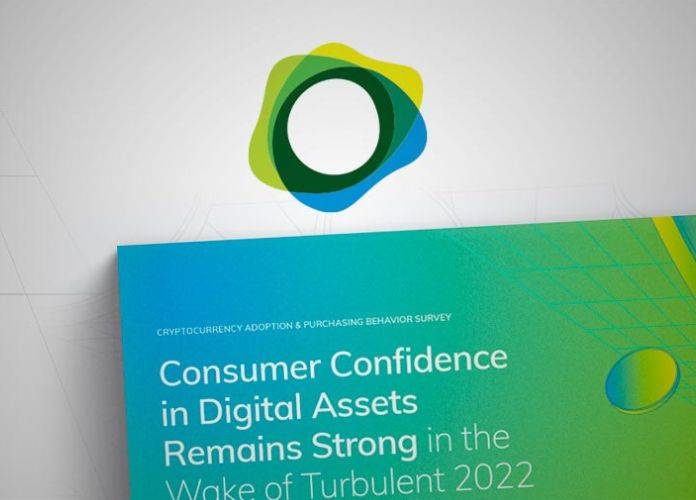Surprise results from a new survey by stablecoin issuers Paxos finds that despite the failures of FTX, Celsius, BlockFi and others, the majority of experienced crypto holders are still comfortable trusting 3rd party custodian services.
In a new survey from Paxos, most consumers remain confident in the future of cryptocurrency and are unphased by volatility. According to the firm’s research, 75 percent of respondents indicated that they are very confident or somewhat confident in the future of cryptocurrency. At the same time, 72 percent reported that they have little or no concern about volatility in the crypto markets despite the turmoil seen in 2022.
Paxos surveyed over 5,000 U.S. residents online between January 5 and 6, 2023 (before the Bitcoin price recovery). Participants had to have purchased crypto within the previous three years. They were also required to be over 18 and have a traditional bank account.
Interestingly, despite the high-profile failures and obvious oversight issues associated with crypto exchanges, consumer trust in intermediaries for crypto holding remains high. When asked what their most desired use cases for crypto are, the top three responses called for greater integration in daily financial activity including such things as paying for goods and services (42 percent); credit cards or loyalty card programs (38 percent); and sending money to friends and family (34 percent).
Other top use cases included long-term investing (52 percent) and day-trading (36 percent).
Paxos is hoping the fact that mainstream consumers remain enthusiastic about cryptocurrencies may increase bank interest in offering crypto services.
Three quarters of respondents indicated that they would be likely or very likely to purchase crypto from their primary bank if it were offered – representing a 12 percent increase over 2022. Additionally, 45 percent of respondents said that they would be encouraged to invest more in crypto if there were more mainstream adoption by banks and other financial institutions, while 40 percent of respondents saying they would consider investing more in crypto if more merchants accepted crypto payments.
It is important to note, however, that many consumers are not aware that ‘investment’ accounts offered through legacy banks are not FDIC insured. This means that while bank U.S. savings accounts or checking accounts are insured in case of bank collapse (and only up to $250,000), mutual funds or stock market portfolios purchased through banks are not.
Given that, mainstream adoption by banks does not necessarily mean that crypto funds processed through a bank would necessarily be covered by insurance.
Paxos Likely To Face SEC Action
Although the Paxos research is clearly looking on the bright side, the fact remains that the company is currently under intense scrutiny from the US Securities & Exchange Commission which has issued it a Wells Notice related to Paxos’s issuance of the Binance USD stablecoin. A Wells Notice is basically a legal ‘heads up’ from the SEC advising potential targets to get their affairs in order as an investigation into a breach of securities laws is underway. This follows New York State financial regulators ordering Paxos to cease issuing BUSD in February.
Nonetheless, the Paxos view seems to be that if the people want it, it will happen. “Despite fears that the rocky end to 2022 would have a chilling effect on consumer crypto adoption, this research shows that consumers are looking for more integration of crypto into their financial lives, not less,” says Mike Coscetta, Head of Revenue at Paxos. “Consumers are increasingly viewing crypto as a primary staple of their financial lives, and traditional businesses and financial institutions that deliver the experiences consumers are looking for in 2023 could carve out a formidable position in the market for years to come.”
Other interesting findings of the research included:
- Despite the bankruptcy of high profile crypto companies like FTX, BlockFi and others, most people (57 percent) who had heard about and followed the bankruptcies planned to buy more crypto or do nothing as a result.
- Banks have key opportunities with older consumers: When asked how likely they were to buy crypto from their primary bank, 81 percent of respondents aged 35-55+ said they were either very likely or likely to do so. Meanwhile, only 63 percent of respondents aged 18-34 said they were very likely or likely to do so.
- Mainstream media is not a popular choice for crypto information: When asked what resources they refer to when making crypto investment decisions, crypto-specific websites (48 percent) and social media (42 percent) were the sources favored most by consumers. These were followed by traditional resources including national media (36 percent) and financial advisors (34 percent).







